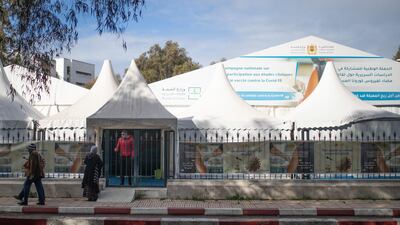Morocco is preparing for an ambitious Covid-19 programme to vaccinate 80 per cent of adults starting this month, relying initially on a Chinese vaccine that has not yet completed advanced trials.
On Tuesday, King Mohammed VI instructed the government to make the vaccine available free of charge, the royal palace said.
Facing a public that is sceptical about vaccine safety and effectiveness, medical experts and health officials have appeared on TV in recent weeks to promote the vaccines and encourage Moroccans to be immunised.
While Britain began its vaccination programme on Tuesday with the Pfizer-BioNTech shots, and as the US and the EU are racing to approve Western-made vaccines, other governments are looking to those from China and Russia.
The World Health Organisation has said new vaccines should first be tested on tens of thousands of people to prove they work and do not cause worrisome side effects before being introduced more broadly.
But the UN health agency also said it was up to individual countries to decide whether there was an urgent domestic need to use a vaccine without data proving its safety.
Morocco is battling a resurgence in infections, with the number of recorded deaths from the virus passing 6,000.
The kingdom is pinning its hopes on two vaccines: one developed by China’s Sinopharm; and the other by Britain’s University of Oxford and AstraZeneca.
The Sinopharm vaccine has been approved for emergency use in a few countries and the company is still conducting late-stage clinical trials in 10 countries.
The AstraZeneca vaccine is still in advanced trials in countries including Britain and the US.
The Moroccan government plans to vaccinate 25 million adults. Priority will go to medical staff and other front-line workers, and the elderly.
It will start with the Sinopharm vaccine, which was tested on 600 Moroccans as part of clinical trials this autumn. Morocco has ordered 10 million doses of the vaccine.
The initial deliveries will come from China but Morocco also plans to produce the vaccine locally, Abdelhakim Yahyan, a senior official at the Ministry of Health, told the state-owned news agency MAP.
Health Minister Khalid Ait Taleb said Morocco was seeking vaccines from several sources because they are a scarce commodity and a single manufacturer’s production capacity is too limited to meet the needs of the world.
The Sinopharm vaccine relies on a tested technology that uses a dead virus to deliver the vaccine, similar to polio immunisations.
Leading western competitors, such as the vaccine made by Oxford and AstraZeneca, use newer, less-proven technology to hit the coronavirus’s spike protein.
Prime Minister Saadeddine El Othmani has sought to reassure those who are hesitant about the country’s regulatory process for vaccine approval, saying no corners have been cut in making sure the Chinese vaccine is safe to administer.
Morocco’s mass immunisation operation will include 2,888 vaccination stations and mobile units to vaccinate people at factories, offices, campuses and prisons.
The Health Ministry said it would mobilise more than 12,000 health professionals and the military to ensure rapid distribution.
The vaccine will be available in the first phase to those at highest risk of contracting the virus, including health professionals, security personnel, essential workers and people suffering from chronic diseases.
No exact date has been set, but the health minister said that “we are doing our best to get it started in mid-December".

